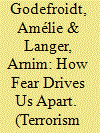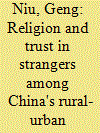| Srl | Item |
| 1 |
ID:
175734


|
|
|
|
|
| Summary/Abstract |
A central aim of terrorism is to drive people apart and destroy social trust. Still, there is little empirical research which has systematically investigated the relationship between terrorist attacks, fear of terrorism, and social trust. In addition, the impact of terrorism is usually assumed to be uniform across different individuals and societies. In order to investigate the impact of terrorism as well as the fear of future terrorism on trust levels of different types of individuals and societies, we combine individual-level survey data of the most recent World Values Survey (WVS, Round 6, 2010–2014) with several indicators at the country-level. Our findings show that social trust is principally damaged by the fear of future terrorist attacks, more so than by past terrorist attacks. Moreover, this deleterious impact of the fear of terrorism on social trust is most prevalent in more democratic countries and among individuals who are more frequently exposed to television news. Hence, with relatively limited capabilities and resources, terrorists may therefore evoke disproportionate fear effects within democratic societies which are, at least partially, fueled by media exposure.
|
|
|
|
|
|
|
|
|
|
|
|
|
|
|
|
| 2 |
ID:
161864


|
|
|
|
|
| Summary/Abstract |
During China's rapid urbanization, the social marginalization of its rural-urban migrants has attracted increasing scholarly and social attention. At the same time, China is experiencing a rising tide of religion, the impact of which on social integration remains unexplored. Based on a large-scale survey for rural-urban migrants, we find that being a religious believer is associated with a higher level of trust towards strangers. In addition, participating in religious-related activities has a positive impact on trust for both believers and non-believers. We test the robustness of our results using instrumental variable analysis. We conjecture that prosocial values in religious teaching and social interaction opportunities contribute to rural-urban migrants' generalized trust. Our results indicate that informal institution such as religion can be important in forming social capital for marginalized social groups.
|
|
|
|
|
|
|
|
|
|
|
|
|
|
|
|